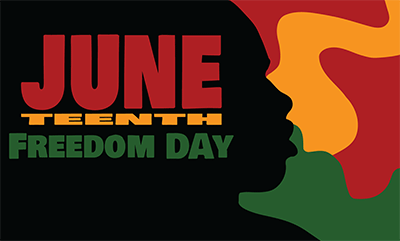
Betsy Herbin-Triant, associate professor of Black studies and history
On June 17, 2021, President Joe Biden signed a landmark bill into law making June 19 the federally recognized Juneteenth National Independence Day holiday commemorating the end of slavery in the United States. While Black communities have celebrated Juneteenth for many generations and the majority of U.S. states have recognized it as well, the federal government had not yet made it an official observance until this year.
We consulted Elizabeth Herbin-Triant, associate professor of Black studies and history, on this milestone. Author of Threatening Property: Race, Class, and Campaigns to Legislate Jim Crow Neighborhoods, Herbin-Triant studies the long history of white supremacy and African-American opposition to white supremacy, and her work combines the fields of African-American history and the history of capitalism, particularly racial capitalism. She will teach "Slavery in U.S. History and Culture" at Amherst this fall.
What real effect do you think the Emancipation Proclamation had on enslaved people?
As historian Eric Foner observed, Black people left slavery with “nothing but freedom.” They had no wealth and very few economic opportunities. While freedom was certainly meaningful—it brought the formerly enslaved the opportunity to reunite with family members who had been sold away, for example, as well as political rights (for a time, at least, during the Reconstruction Era)—it was not a robust freedom. By that, I mean that the freedom enjoyed by the formerly enslaved did not look like the freedom enjoyed by white people. It was characterized by second-class citizenship. During the Jim Crow years, Black people could not vote in much of the South, were stuck in low-paid jobs and were subject to lynchings and other forms of racial terror.
Yet there was great joy in gaining freedom, and that’s what Juneteenth is about. It’s about celebrating survival—that Black people were able to create strong social ties and a vibrant culture that helped them to make it through numerous hardships.
Would you say that slavery, in some form, has remained after Emancipation was declared?
I wouldn’t say that slavery itself has continued. There were other methods of keeping Black people as second-class citizens that were used, such as racial violence, policies that disenfranchised Black people and customs that reserved good jobs for white people, to name a few. White people—particularly in the South—had a strong interest in keeping things as they had been before the end of slavery. They wanted African Americans back in the cotton fields growing the same crop they’d grown during slavery at the bottom of the social hierarchy. They didn’t want them to vote or hold political office, and they didn’t want to socialize with them. After Reconstruction’s end, these people were back in political power.
Given these things, it was very difficult for African Americans to do what they wanted to do: gain property and education, for one. It wasn’t impossible, though, and some Black people did gain education, wealth and political influence, especially in certain areas. Certainly, and we saw this with the Tulsa Race Massacre, there was a backlash against many of those Blacks who did find success.

It’s a holiday that doesn’t center white people, so it perhaps has been viewed as sort of a “niche” holiday.
How do you personally feel about the federal government declaring Juneteenth a national holiday?
I’m happy to have Juneteenth declared a national holiday, and I consider this an important first step for the federal government to take. I hope this will encourage Americans to look at their nation in a clear-eyed way—to remember both the bad and good. Americans need a holiday that reminds them of both the mistakes made by their own government (such as making slavery legal) and the work that has been done to address those mistakes (such as the 13th, 14th and 15th amendments to the Constitution). With Juneteenth, we’re celebrating the progress America has made away from legal slavery, and we’re thinking about the changes that still need to be made to allow Black people true equality.
At the same time, I think a national holiday isn’t enough—the federal government needs to do more to address the long-term effects of slavery. It needs to do other essential work—considering reparations, for example, which would be essential in addressing the racial wealth gap.
I’ll add that within the Black community there are a number of people who don’t necessarily consider making Juneteenth a national holiday to be a good thing—there’s fear that it will be co-opted or made meaningless, that it’s a band-aid that’s being slapped on. While I understand how people can feel that way, I view it differently. As a historian, I’m always glad to see history being discussed. Especially right now, we are seeing a lot of resistance to the teaching of slavery (particularly through The 1619 Project) and critical race theory. In my opinion, encouraging Americans to learn more about their troubled history is of great importance, and I think that having a national Juneteenth holiday can help with this.